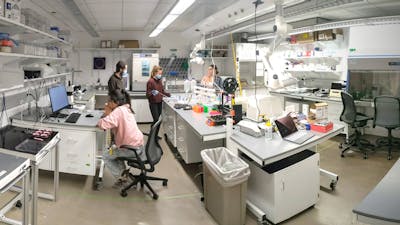- High-throughput platform can analyze up to 1,000 live tadpole models simultaneously and non-invasively, providing whole-organism cognitive, behavioral, and physiological data
- Platform is target-agnostic, allowing it to be used to identify existing and novel drugs for many rare genetic diseases
- System uses real patient data to ensure that drugs actually alleviate symptoms in patients suffering from disease

CogniXense for Rare Disease Drug Discovery
High-throughput, whole-organism drug discovery platform for rare genetic diseases
Bioinspired Therapeutics and Diagnostics
Unravel Biosciences has licensed a Wyss drug discovery platform technology to identify and create drugs to treat central nervous system disorders.
The Problem
Many diseases of the central nervous system, like bipolar disorder and Alzheimer’s disease, have complex effects on patients’ mental and behavioral functions. This complexity is difficult to replicate in animal models, so drugs that are developed to treat these diseases are often found to be ineffective when they are first tested in human clinical trials. In addition, these diseases often manifest differently in different patients, making it difficult to identify a single molecular target that will treat all patients’ symptoms. In the face of these challenges, traditional drug development processes have largely failed to produce effective treatments for these diseases.
Our Solution

The Wyss Institute’s CogniXense platform is an alternative to traditional drug development that enables the identification and creation of compounds to treat cognitive and behavioral conditions. CogniXense combines predictive algorithms, a tadpole-based drug screening system, and an iterative discovery process to rapidly advance effective treatments through preclinical development to human clinical trials.
Product Journey
CogniXense was created in 2015 when members of the Wyss Institute led by Founding Director Don Ingber, M.D., Ph.D. started working on a DARPA-funded research project to identify drugs that could induce human tolerance to sepsis and other forms of infection. To figure out whether their candidate drugs might have any unexpected side effects on the brain, the team developed a cognitive assay and behavioral screening system using Xenopus laevis frog tadpoles, led by Lead Staff Engineer Richard Novak in collaboration with Wyss Associate Faculty member Mike Levin, Ph.D.
The scientists quickly realized that their screening platform could be used to predict and test the cognitive and behavioral effects of a wide range of drugs in a whole-organism context. This ability could reveal problematic side effects of drugs before they are given to human patients in clinical trials, and also provide a model for testing drugs to treat complex diseases of the central nervous system.
A team was formed to develop CogniXense for that purpose. They focused their initial proof-of-concept on Rett syndrome, a rare genetic disease that causes debilitating physical and mental problems in the ~10,000 patients who are born with it every year and has no cure or treatment. In their first test, the team found that their Xenopus model replicated behavioral differences observed between healthy patients and those with Rett syndrome. They also identified several drugs that reversed the tadpoles’ symptoms.
Based on this potential, the team was awarded Validation Project funding in 2018 and 2019 to de-risk and develop CogniXense into a platform that could be multiplexed and automated.
Components of the CogniXense platform have also been used in the Wyss Institute’s Biostasis and CircaVent projects.
Impact

Unravel Biosciences was launched from the Wyss Institute in 2021 to commercialize CogniXense. The company has customized it to create their proprietary BioNAV™ platform, which uses transcriptome and proteome data from Rett syndrome patients as the starting point for identifying and developing effective drugs. This system runs counter to the traditional drug development process, which starts with a molecular target of interest and then designs drugs to disrupt that target. Unravel computationally predicts which existing drugs could restore health in an individual patient, validates those drugs in its engineered animal models and focused clinical trials, and from there identifies the underlying molecular targets that could be drugged to treat the disease across patient populations.
Because Rett syndrome is so rare, it can be difficult to find enough patients to generate the data needed. In July 2022, Unravel announced a partnership with TMA Precision Health (TMA) to leverage TMA’s database of patients with rare diseases in global regions that have historically been underrepresented in medical research. The companies plan to use this additional data to help accelerate Unravel’s first drug candidate, a proprietary oral liquid formulation, toward clinical trials.